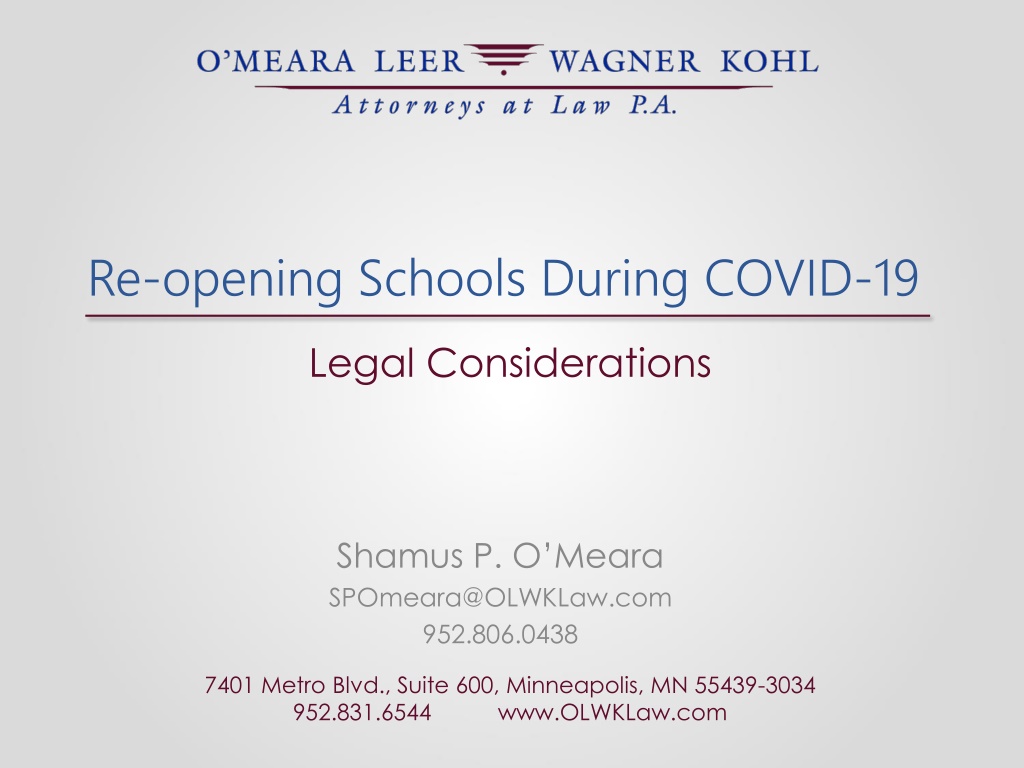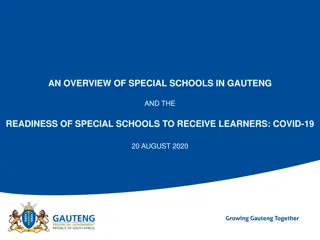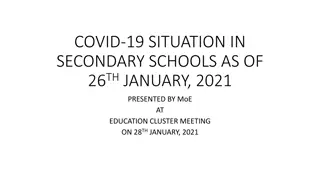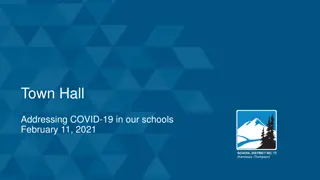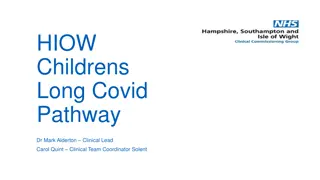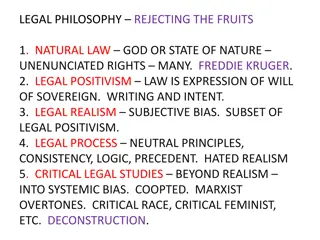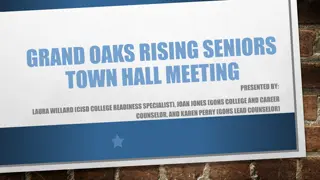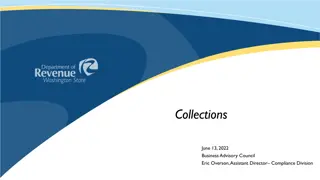Legal Considerations for Re-opening Schools Amid COVID-19
Public school districts have legal responsibilities in ensuring safety during the COVID-19 pandemic. This includes developing re-entry protocols, updating emergency management plans, and implementing COVID-19 policies. Collaboration with various local assets is crucial, along with compliance with federal, state, and local directives. Attention must be given to safety standards, contract liabilities, and continuity of operations to minimize risks and ensure the well-being of students, staff, and the community.
Download Presentation

Please find below an Image/Link to download the presentation.
The content on the website is provided AS IS for your information and personal use only. It may not be sold, licensed, or shared on other websites without obtaining consent from the author.If you encounter any issues during the download, it is possible that the publisher has removed the file from their server.
You are allowed to download the files provided on this website for personal or commercial use, subject to the condition that they are used lawfully. All files are the property of their respective owners.
The content on the website is provided AS IS for your information and personal use only. It may not be sold, licensed, or shared on other websites without obtaining consent from the author.
E N D
Presentation Transcript
Re-opening Schools During COVID-19 Legal Considerations Shamus P. O Meara SPOmeara@OLWKLaw.com 952.806.0438 7401 Metro Blvd., Suite 600, Minneapolis, MN 55439-3034 952.831.6544 www.OLWKLaw.com
Legal Responsibility for Safety Standard of Reasonableness public school districts must act with reasonable care under the circumstances School districts are immune from liability in certain situations e.g., discretionary decisions based on budget considerations No immunity for failure to comply with federal law School districts can be liable under contract
Legal Responsibility for Safety o Develop and implement appropriate re-entry protocol PPE, social distancing, remote/distance learning, design reconfiguration, etc. Use recommended approaches from CDC, DOE, MDH, MDE and other sources CDC Reopening Guidance; Minnesota School Boards Association; National School Boards Association, U.S. DOE COVID-19 Information and Resources for Schools Consider and include process for exceptions/modifications e.g, at-risk students, students with disabilities o Collaborate with local assets city, county, township, mutual aid, cooperatives, local health resources, police, fire, insurers and risk managers, design professionals, program managers
Legal Responsibility for Safety o Update Your Emergency Management Plan District-wide school safety plan and building-level emergency response plans Incident command structure Medical-related decisions and actions informed by medical advice Continuity of Operations Plan (COOP) deliver, continue, sustain, and reconstitute essential services Modify and amend plans consistent with federal, state and local governmental directives
Develop COVID-19 Policies Emergency resolution assist implementation of COVID-19 policies Remote board and committee meetings; open meeting compliance Suspend policies conflicting with state or local emergency orders School building closure/distance learning plan and alternatives Technology plan and assistance; requirements for distance learning Facilities plan to minimize risk of infection Budget considerations and revision Staff leave/PTO policies and procedures Student attendance policies and procedures Facility use policies restricted use, specific locations, leases, cleaning protocol Medical/student record protocol for COVID-19 Include written criteria for determining legitimate educational interest in education/health records for notification to parents per FERPA Communications plan internal, external, students, parents, staff, partners, community
Develop COVID-19 Policies o Update Student-Parent and Staff Handbooks with Infectious Disease Policy including COVID-19 e.g., attestation, symptoms, exposure, temperature checks, specific procedures, contact tracing, self-quarantine, Informed Consent o Review and comply with record-keeping requirements and applicable statutes HIPAA, FERPA, IDEA, ADA, DPA, Open Meeting o Address/modify contracts as necessary collective bargaining, joint powers, MOU, BAA, mutual aid, cooperative, vendor contracts o Develop and implement human resources management plan e.g., essential employees; remote working, safety protocols, policy training and enforcement, communication and management structures, technology needs, school calendar with contingencies, regularly update
Develop COVID-19 Policies o Address and modify policies relating to students with disabilities U.S. DOE Office for Civil Rights March 21, 2020 Supplemental Fact Sheet - Addressing the Risk of COVID-19 in Preschool, Elementary and Secondary Schools While Serving Children with Disabilities School districts must provide Free and Appropriate Public Education (FAPE) consistent with the need to protect the health and safety of students with disabilities and those individuals providing education, specialized instruction, and related services to these students. FAPE may include, as appropriate, special education and related services provided through distance instruction provided virtually, online, or telephonically.
Develop COVID-19 Policies It is important to emphasize that federal disability law allows for flexibility in determining how to meet the individual needs of students with disabilities. The determination of how FAPE is to be provided may need to be different in this time of unprecedented national emergency. Educational distance learning plans can be developed and implemented consistent with Section 504 of the Rehabilitation Act and Title II of the Americans with Disabilities Act.
Student Records & Privacy Exceptions o Family Educational Rights and Privacy Act (FERPA) protects privacy of student education records including student personal health records. Prior written consent of a parent or eligible student required. o Exception: School official can access personally identifiable information about students for legitimate educational interests o If a school official, considering the totality of the circumstances, determines an articulable and significant threat exists to the health or safety of a student from COVID-19, the official may disclose the student s personally identifiable information to a public health department to protect the health or safety of the student or another individual o FERPA does not prevent schools from informing parents and students that a specific teacher or other school official has COVID-19.
Student Records & Privacy Exceptions o The HIPAA Privacy Rule establishes national standards to protect individuals medical records and other personal health information, protecting the privacy of personal health information, and limiting use and disclosure without patient authorization. o In most cases HIPAA does not apply to school districts as they are not a covered entity under the act. o The HIPAA Privacy Rule does not apply to education records protected by FERPA. Student health records maintained by a public school district are education records subject to FERPA, and school officials must follow FERPA for any disclosures from these records o U.S. DOE - FERPA and Virtual Learning o U.S. Department of Education - FERPA and COVID-19 o U.S. HHS - HIPAA and COVID-19
Thank You Shamus P. O Meara SPOmeara@OLWKLaw.com 952.806.0438 7401 Metro Blvd., Suite 600, Minneapolis, MN 55439-3034 952.831.6544 www.OLWKLaw.com
